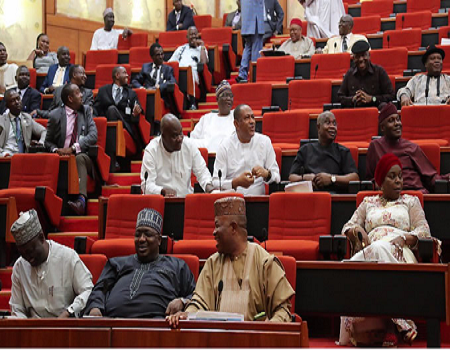A Bill to domesticate substantial part of oil and gas exploration and production activities within Nigeria passed second reading in the Senate on Tuesday.
Sponsored by Senator representing Oyo Central, Teslim Folarin, the Nigerian Oil and Gas Industry Content Development Act 2010, the bill seeks to boost participation of indigenous players in the oil and gas sector.
Presenting his lead debate, Senator Folarin who incidentally is the Chairman Senate Committee on Local Content said the bill sought to amend 38 Sections of the extant Act to bring it in sync with industry best practices.
Specifically, Senator Folarin listed Sections 11, 33, 37, 38 and 39 amongst others.
He submitted that amendment of Section 11 would give the Ministry of Petroleum the latitude to review upward the engagement of local players in the strategic sector.
ALSO READ: Oyetola seeks Osun Assembly’s confirmation of Oladitan as chairman of OSIEC
The lawmaker recalled that the Nigerian Oil and Gas Industry Content Act, passed in 2010 sought to among others, address the poor engagement and profile of indigenous operators in the oil and gas sector of the economy; create a regulatory mechanism to monitor and enforce compliance by industry players; and to domesticate substantial part of oil and gas exploration and production activities within Nigeria.
He said:” You will recall that before this Act came into force in 2019, over ninety per cent of the $20 billion spent yearly in the Nigerian oil and gas industry was repatriated abroad.
“This was because a large chunk of the contracts was executed by foreign companies and in foreign facilities. With only a few indigenous players and facilities participating in the contracting process in the industry, Nigerian content was less than five per cent.”
Senator Folarin praised the initiative of those who pushed the Nigerian Content Development and Monitoring Board, as he noted that it has enabled Nigerians to carry out a lot of onshore upstream activities.
“There has been a boost in the promotion of indigenous participation and the fostering of technology transfer as reflected in appreciable local growth. Only recently, one of Nigeria’s indigenous oil servicing firms established a 100 million fabrication plant in the Niger Delta region.
“The implementation of the Nigerian Content Fund by the Board has also facilitated the provision of capital and financial support to several indigenous companies.”
The lawmaker argued that the proposed amendment to Section 33 of the Act would streamline and strengthen the process for obtaining expatriate quota to close the gap for current leakages and manipulation by foreign companies. Similar amendments to Sections 37, 38 and 39, Folarin further argued aimed “to improve the provisions relating to research and development and to ensure proper implementation, while Section 76 is proposed to give the Governing Council of the Board the role of Superintending over the conditions of service of employees of the board. ”
Speaking in favour of the bill, Senator representing Lagos West and Chairman Senate Committee on Finance, Olamilekan Solomon Adeola, said the amendment became apposite to guarantee domestication of the strategic oil and gas industry.
“This amendment is long overdue, and I want to believe it would stand. The Nigeria Oil and Gas Industry Content Bill should now be Nigeria Industry Content Development Act.”
“Now that we have succeeded in trying to see that local content has come to stay in the oil and gas sector, it is time for us to move to other line sectors which include manufacturing, ICT, construction and other sectors of the economy.
“The main objective of this particular Act is for two things: for Domestication and Domiciliation. That is the reason ab initio, the local content was set-up.”
The Nigerian Oil and Gas Industry Content Development Bill 2020, was consequently referred by the Senate President, Senator Ahmad Lawan, to the Committee on Local Content for further legislative work. It has four weeks to submit its report to the Senate.




